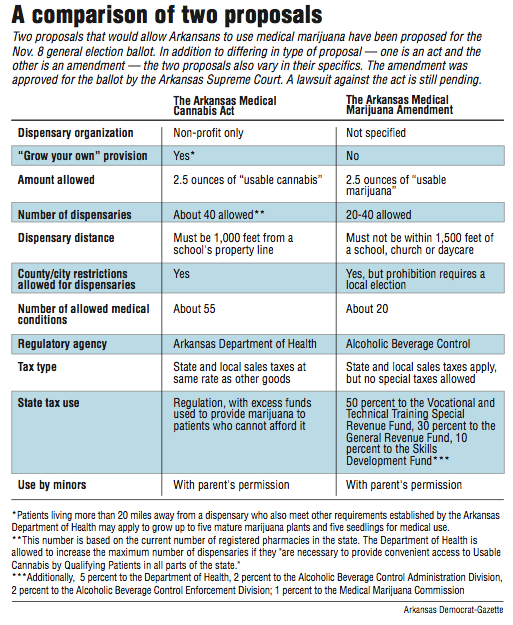Supporters and opponents of medical marijuana are focusing on the opinions of physicians and law enforcement officers with just days until early voting begins on two competing ballot measures.
Arkansas Attorney General Leslie Rutledge, state Crime Laboratory Director Kermit Channell and others took to the steps of the Capitol on Wednesday to decry both the Arkansas Medical Marijuana Amendment and the Arkansas Medical Cannabis Act.
"We are a compassionate state. Each and every one of us knows someone who has been impacted and affected by cancer or other serious illnesses," Rutledge said. "However, as compassionate as we are, we want those individuals to receive those treatments and those medicines through their doctors ... through the FDA."
She said the state already has an epidemic of illegal opiate use with which law enforcement is struggling.
Chuck Graham, president of the Arkansas Prosecuting Attorneys Association and prosecuting attorney in the 23rd Judicial Circuit in Lonoke County, said if someone has a serious illness, "nobody is kicking their door down if they have marijuana and going after those folks. That's just not happening."
In an interview after the news conference, he said that if police brought him a case of a cancer patient who had marijuana, he would have to "look at it and do what we're supposed to do," but he had never seen such a case.
Police don't prioritize medical patients using marijuana over other sorts of crime, Graham said.
Channell said the Crime Lab did not have the equipment, space, personnel or resources to test the blood of drivers to see if they are impaired by marijuana. He was worried that an increased number of people would need to be tested if either ballot measure is approved by voters.
"The biggest cutback that I see is to the victims of violent crime," he said. "They rely on us to have the speedy service on toxicology results so they can get official death certificates, and all of this will delay that."
In an interview, Cindy Moran, scientific operations director for the Crime Lab, said the machine needed to test blood would cost about $500,000.
"It's not just an Arkansas problem," Channell said. "It's a problem nationwide, with toxicology labs being able to test efficiently."
The Arkansas Association of Chiefs of Police and Arkansas State Police Director Bill Bryant also said they were against the medical marijuana ballot measures.
Then in Fayetteville, a member of the group supporting the cannabis act, two doctors and a former cancer patient gathered midday to dispute opponents' contention that medical marijuana would do more harm than good.
"There is a mountain of scientific evidence showing cannabis is safe and effective," said Ryan Denham, deputy director of Arkansans for Compassionate Care. The University of California Center for Medicinal Cannabis Research, he said, found in recent years that the substance can treat pain caused by complications of diabetes, HIV and other illnesses.
Emily Williams, a Fayetteville resident, was diagnosed in 2010 with two different types of lymphoma, a cancer that affects the immune system. She said her particular variety of chemotherapy caused intense bodywide pain and relentless nausea.
"It's like having the flu and somebody ramping up the flu to this horrible level, and then giving you a stomach virus on top of it," she said.
The nausea medications given by her doctor didn't help at all, Williams said, and within a few hours of the chemotherapy, she reluctantly took up a friend's offer for some marijuana.
She said the effect was almost immediate. The "excruciating" headache, nausea and pain vanished, and while she still felt somewhat ill, she was well enough to take a shower and go to sleep.
"It truly felt like a miracle," said Williams, emphasizing her nausea medicine wouldn't have taken care of the pain even if it had worked as intended. She said her cancer is now in remission but is likely to return, and others with serious medical conditions, such as multiple sclerosis, could also benefit from medical marijuana.
"I don't understand saying you can't have it," she said, calling the stigma against marijuana societal "madness." "There are people for whom it is a necessity right now."
Dr. Bill Piechal, a Fayetteville doctor of osteopathy who specializes in pain management, said the human body naturally makes and absorbs chemicals similar to those in marijuana, which affect immune response, inflammation and other body processes. He said approving the Arkansas Medical Cannabis Act would benefit Arkansans while prodding the federal government to allow more research into the drug's medical benefits.
"It pushes the ball just a little bit forward," Piechal said. "It puts cannabis in the hands of people who need it and at a price they can afford."
Piechal was joined by retired Dr. David Crittenden, who said he's never recommended marijuana but has had "plenty of patients" who've used and benefited from it.
"This gives autonomy to patients," he said.
Representatives from the Arkansas Medical Society, Arkansas Hospital Association, Family Physician Association, Pharmacy Association, University of Arkansas for Medical Sciences, Arkansas Children's Hospital, Arkansas Center for Health Improvement, Arkansas Department of Health and Arkansas Heart Hospital have all previously said they are against both medical marijuana ballot measures.
Twenty-five states, plus Washington, D.C., Guam and Puerto Rico, have enacted laws to allow marijuana use for medical purposes. No Southern state currently allows medical marijuana.
A medical marijuana proposal failed to pass in Arkansas in 2012, but it received 49 percent of the vote.
Metro on 10/20/2016
